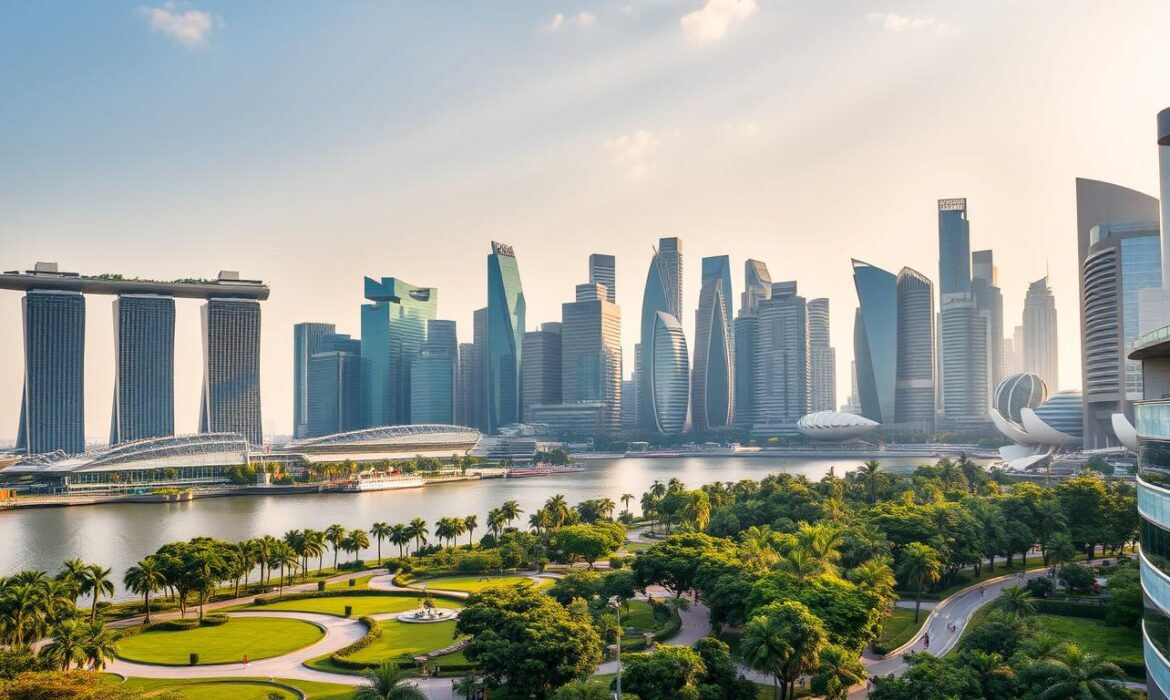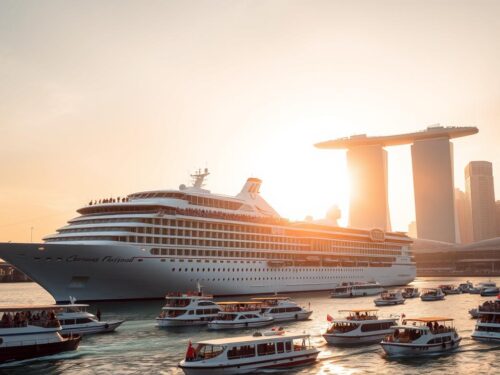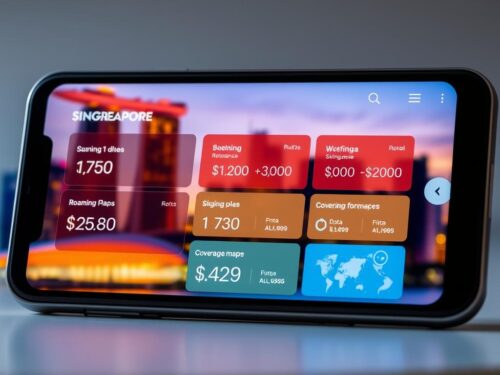Singapore is a vibrant destination with something exciting happening all year. Whether you love sunny beaches, cultural festivals, or thrilling events, this city-state delivers. The key to an unforgettable trip lies in choosing the right time based on weather, crowds, and special occasions.
In 2024, major events like the Formula One Night Race and anniversary celebrations add extra flair. This guide helps you balance ideal conditions with unique experiences. From avoiding heavy rains to catching dazzling festivals, we’ve got you covered.
Key Takeaways
- Singapore offers year-round attractions for every traveler.
- Weather patterns and festivals impact the ideal travel period.
- 2024 features exclusive events like the F1 Night Race.
- Plan around peak seasons to avoid crowds.
- Monthly breakdowns simplify trip planning.
Introduction to Singapore’s Year-Round Appeal
From towering skyscrapers to serene gardens, the city thrives year-round. Its port heritage blends Chinese, Malay, and Indian influences, creating an immersive cultural experience. Whether exploring Marina Bay Sands or Sentosa island’s beaches, every corner tells a story.
This compact country boasts a tropical climate, with temperatures steady between 77–90°F. Rain or shine, visitors enjoy world-class museums, air-conditioned malls, and the iconic Gardens by the Bay.
Festivals light up the calendar every month. Lunar New Year parades, Deepavali lights, and Christmas markets ensure there’s always excitement. The mix of modern architecture and green spaces makes outdoor activities just as appealing as indoor escapes.
No matter when you arrive, Singapore delivers unforgettable moments. Its efficient transport and weather-resistant attractions guarantee smooth adventures all year.
Understanding Singapore’s Weather: When to Go
Singapore’s humidity and rain showers shape its unique travel rhythm. With 167 rainy days annually, the weather alternates between sunshine and sudden downpours. Planning around these patterns ensures comfort while exploring.
![]()
Singapore’s Tropical Climate Explained
The city sits near the equator, with steady heat (77–90°F) year-round. Two monsoon seasons dominate:
| Monsoon | Months | Characteristics |
|---|---|---|
| Northeast | Dec–Mar | Heavy rain, cooler temps (81°F) |
| Southwest | Jun–Sep | Shorter showers, higher humidity |
| Inter-Monsoon | Apr–May, Oct–Nov | Mixed conditions, occasional storms |
Dry Season vs. Wet Season: What to Expect
June and July are the hottest months, hitting 88°F. The dry season (Feb–Apr) offers sunnier skies, while December’s northeast monsoon brings prolonged rain.
Humidity averages 80%, peaking in summer. Lightweight, quick-dry fabrics help manage sweat and showers.
Tips for Handling Humidity and Rain
- Pack smart: Waterproof shoes, a compact umbrella, and a portable fan.
- Seek refuge: Air-conditioned malls, MRT stations, or museums during midday heat.
- Time outings: Mornings and evenings avoid peak weather extremes.
With flexibility, Singapore’s climate becomes part of the adventure—not a setback.
Best Time to Visit Singapore for Ideal Weather
Balancing sunshine and showers is key to enjoying Singapore’s outdoor wonders. February to April offers the most comfortable period, with temperatures between 79–88°F and fewer rainy days. Mornings are perfect for exploring Gardens by the Bay or Sentosa’s beaches before afternoon heat peaks.
November to January brings brief but frequent showers, while May and June hit the high 90s. Coastal areas like East Coast Park feel breezier, but urban zones trap heat. Check the UV index—it often reaches 10+ by midday.
| Month | Avg. Temp (°F) | Rainfall (inches) | Best For |
|---|---|---|---|
| Feb–Apr | 79–88 | 6.3 | Hiking, festivals |
| May–Jul | 86–90 | 6.7 | Indoor attractions |
| Nov–Jan | 77–84 | 9.8 | Museum visits |
Microclimates add variety. Chinatown’s narrow streets feel hotter than Marina Bay’s open spaces. For detailed forecasts, compare monthly trends to plan around your preferred activities.
Pack light layers and a foldable umbrella. With smart timing, you’ll savor Singapore’s vibrant streets without battling extreme weather.
Singapore’s Festivals and Events in 2024
Singapore’s calendar bursts with vibrant festivals and thrilling events throughout 2024. Each month offers unique celebrations, from lantern-lit streets to high-speed races at Marina Bay. Plan your trip around these highlights to dive into the city’s rich culture and electrifying energy.
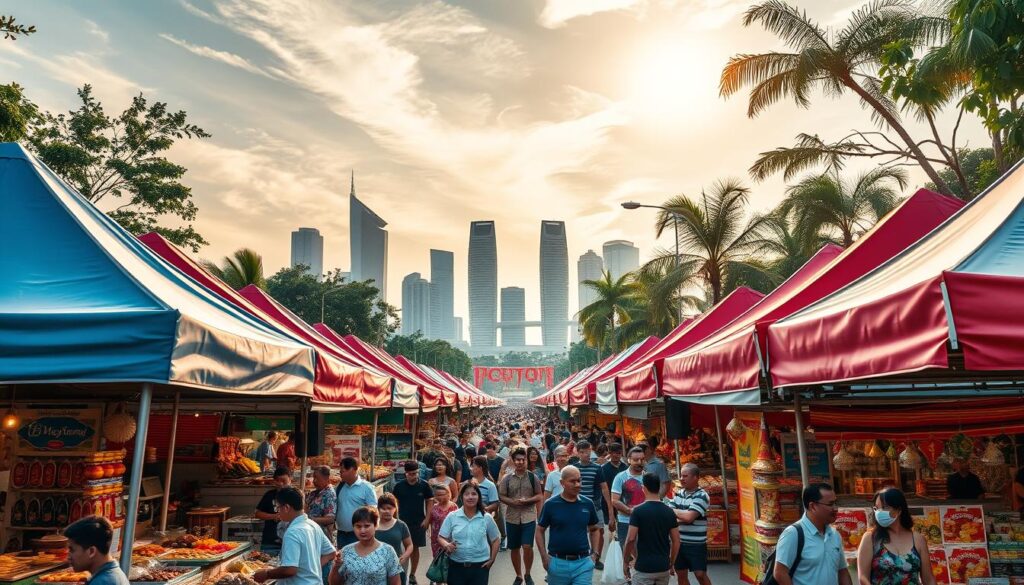
Chinese New Year (February)
Chinatown transforms into a red-and-gold wonderland during Lunar New Year. Street closures allow for lively bazaars, where stores sell traditional treats and decorations. Don’t miss the Chingay Parade, a dazzling mix of floats and performers.
Holi and Thaipusam (March)
March celebrates diversity with Holi’s colorful powder fights and Thaipusam’s piercing processions. The latter winds from Serangoon Road to Tank Road, a powerful display of devotion. Check the official website for exact dates and routes.
Singapore Food Festival (June–July)
Foodies rejoice during this month-long celebration. Hawker masterclasses, Michelin pop-ups, and heritage tours spotlight local flavors. The gardens at Bay East often host gourmet picnics under the stars.
National Day (August)
August 9th marks Singapore’s independence with aerial shows and fireworks. Rehearsals in late July offer previews—grab a spot at the Padang or Marina Barrage for the best views.
Formula One Night Race (September)
The Marina Bay Street Circuit roars to life under neon lights. Book tickets early; they sell out fast. Afterparties at luxury hotels and Clarke Quay extend the adrenaline rush.
Deepavali and Christmas (November–December)
Little India glows for Deepavali, while Orchard Road dazzles with Christmas lights. The year ends with ZoukOut, a beachfront dance holiday perfect for night owls.
Peak Tourist Seasons: Crowds and Prices
Tourist crowds and hotel rates spike during specific months in this bustling city. June and July—summer school holiday—see hotel prices jump 30%, while Formula One weekends triple rates near Marina Bay. December’s festive buzz also draws packed flights and sold-out stores.
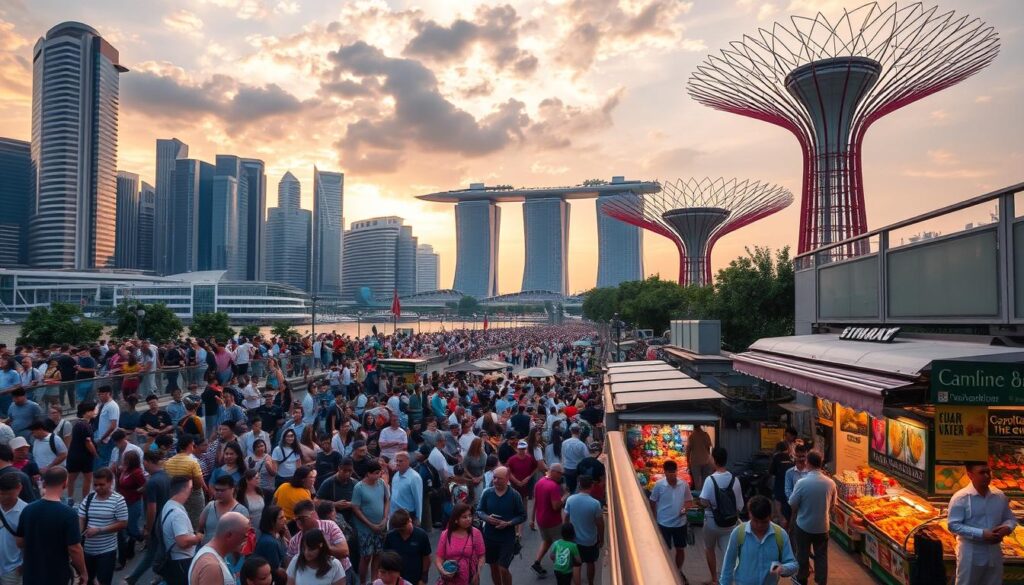
Popular attractions like Universal Studios and Gardens by the Bay face hour-long queues. Midday heat worsens waits, so arrive early or book skip-the-line passes. For major events, VIP packages offer reserved seating and express entry.
Flight prices fluctuate by carrier. Budget airlines like Scoot hike fares during peak days, while Singapore Airlines often holds steadier rates. Set fare alerts and book 3–4 months ahead for savings.
Last-minute strategies:
- Check boutique hotels in Kampong Glam or Joo Chiat for hidden deals.
- Use apps like Klook for discounted same-day attraction tickets.
- Visit hawker centers during lunch rushes (11:30 AM) to beat crowds.
“Event weekends transform the city—book early or embrace the lively chaos.”
Travelers who prefer quieter months can explore Section 7 for off-peak perks. But if you’re set on festivals or races, planning ensures you’ll enjoy the energy without overspending.
Off-Peak Travel: Benefits of Visiting During Quieter Months
April and October unlock exclusive perks for savvy travelers. These months offer 20% lower hotel rates and 15% fewer visitors, making it the perfect time to explore Singapore’s hidden gems. From spa retreats to cultural deep dives, the experience feels more personal.
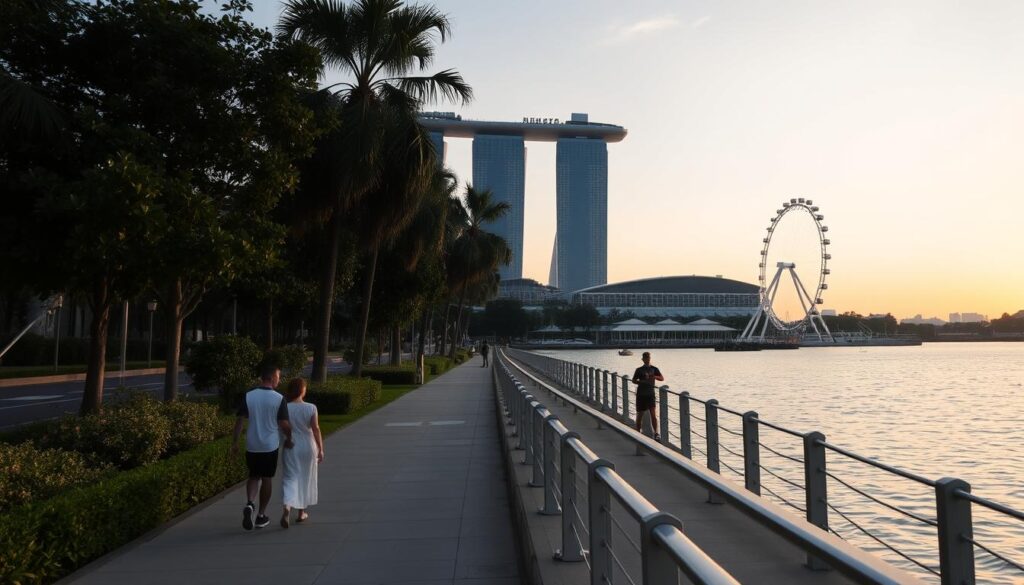
April to May brims with limited-time offers. Luxury resorts roll out spa packages, while rooftop bars host sunset happy hours. Local chefs showcase seasonal menus, turning meals into unforgettable activities.
October’s calm reveals another side of the island. Neighborhoods like Tiong Bahru and Katong offer guided heritage walks—rare during peak periods. Wildlife reserves like Sungei Buloh feel quieter, boosting birdwatching success.
Top off-peak advantages:
- Upgrade odds: Hotels often bump guests to suites during low occupancy.
- Error fares: Airlines drop prices mid-week in October.
- Photo ops: Iconic spots like Merlion Park have no crowds.
“Off-season travel lets you see Singapore through a local’s eyes—minus the rush.”
Pack light layers for sporadic showers. With fewer lines and more space, you’ll savor every moment.
Monthly Breakdown: What to Do in Singapore Each Month
Every month in Singapore brings fresh excitement and unique experiences. Whether you crave cultural festivals, sports thrills, or gourmet adventures, the city’s calendar never disappoints. Here’s how to make the most of each season.
January–March: Festive Beginnings
January kicks off with extended shopping deals from the Great Singapore Sale. February dazzles with Lunar New Year parades in Chinatown—red lanterns, lion dances, and prosperity treats fill the streets.
March celebrates diversity. Holi’s colorful powder fights and Thaipusam’s piercing processions showcase Singapore’s multicultural heart. Book early for riverfront hotel views.
April–June: Sports and Food Highlights
April’s World Gourmet Summit turns the city into a food lover’s paradise. Michelin chefs host pop-ups, while hawker centers spotlight heritage dishes.
May packs adrenaline with the Rugby Sevens tournament and Cocktail Festival. Sip creative drinks at rooftop bars or cheer at the National Stadium.
July–September: National Celebrations
August’s National Day holiday features aerial drills and fireworks. Insider tip: Catch free preview shows in late July at Marina Barrage.
September revs up with the Formula One Night Race. Neon-lit speed and afterparties at Clarke Quay make this a bucket-list experience.
October–December: Year-End Festivities
November lights up Little India for Deepavali. Golden lamps and flower garlands transform the streets. Don’t miss the bazaars for silk saris and spicy sweets.
December sparkles with Christmas on Orchard Road and NYE fireworks at Marina Bay. For the best views, stake out spots near the Merlion or Esplanade Roof Terrace.
“Singapore’s monthly rhythm means there’s always a reason to celebrate—plan around your passions.”
Practical Tips for Visiting Singapore in 2024
Visitors in 2024 can optimize their trip with these practical local insights. Whether facing sudden showers or navigating event crowds, preparation transforms challenges into seamless adventures.
Packing Essentials for Tropical Conditions
Singapore’s 80% humidity demands lightweight, quick-dry clothing. Pack a compact umbrella—downpours arrive unexpectedly. Moisture-wicking fabrics outperform cotton for all-day comfort.
Essential extras include:
- Portable fan for outdoor queues
- Waterproof phone case for boat rides
- SPF 50+ sunscreen (local brands like Skin Inc work best)
Navigating Public Holidays and Closures
Check the 2024 holiday calendar before booking. Major festivals like Deepavali see 70% of stores close. Attractions remain open but with limited capacity.
Key closure dates:
- Lunar New Year (Feb 10-11)
- Hari Raya Puasa (Apr 10)
- Christmas (Dec 25)
Smart Booking Strategies
Popular attractions like Gardens by the Bay require online reservations 3+ days ahead. Use official websites to avoid third-party markups. For Formula One, review prohibited items (e.g., large bags) when purchasing tickets.
Pro tips:
- SIM cards at Changi Airport offer best rates
- Weekday hotel check-ins save 15%
- Visitor centers provide real-time crowd maps
“Early planners enjoy Singapore’s highlights without the stress—book key elements first, then improvise.”
Save emergency contacts (999 for police) and download transport apps like Citymapper. With these tips, your experience will be as smooth as the city’s famous MRT system.
Conclusion: Planning Your Perfect Singapore Trip
Choosing when to explore this dynamic city depends on your priorities. Love sunny skies? February to April delivers. Prefer cultural buzz? Align with festivals like the Sultan Mosque’s 2024 anniversary.
Consider pairing your stay with nearby gems. Malaysia’s Langkawi or Indonesia’s Bintan island complement Singapore’s urban energy. Ferries and short flights make it easy.
Double-check visa rules and passport validity before booking. Pack a rain-ready guide—weather apps and emergency contacts ensure smooth adventures. With smart prep, every year offers unforgettable moments here.

